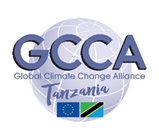GCCA Tanzania

The GCCA was established by the European Union (EU) in 2007 to strengthen dialogue and cooperation with developing countries, in particular least developed countries (LDCs) and small island developing States (SIDS). Today it has a budget of more than €300 million and is one of the most significant climate initiatives in the world. It supports 51 programmes around the world and is active in 38 countries, 8 regions and subregions and at the global level.
Using ambitious and innovative approaches, GCCA will achieve its goals by building on its two mutually reinforcing pillars:
-
Under the first pillar, the GCCA+ serves as a platform for dialogue and exchange of experience between the EU and developing countries, focusing on climate policy and bringing renewed attention to the issue of international climate finance. The results feed into negotiations for a new climate deal under the United Nations Framework Convention on Climate Change (UNFCCC).
-
Under the second pillar, the GCCA+ acts as a source of technical and financial support for the world’s most climate-vulnerable countries, whose populations need climate finance the most. Extra efforts will be made to strengthen the strategically important issues of ecosystems-based adaptation, migration and gender equality.
GCCA in Tanzania: Enhancing adaptive capacity through sustainable natural resource management
Overall objective: Increase the capacity of vulnerable Tanzanian communities to adapt to the adverse effects of climate change and contribute to poverty reduction in rural areas.
Specific objective: Enhance environmental sustainability and food security by strengthening the management of natural resources at the local level. In so doing, the project will seek to contribute to gender equality and good governance by actively promoting transparency and accountability.
Main expected results and activities:
- The piloted integrated eco-village approach is extended and implemented in the most climate change vulnerable agro-ecological zones of Tanzania.
- Institutional capability to assess, plan and implement climate change strategies is enhanced in selected ward, division and district levels of local government.
- Knowledge management is improved to facilitate the exchange of experience and lessons learned under the eco-village approach and the communication of results to key stakeholders, policy makers and the public at large.